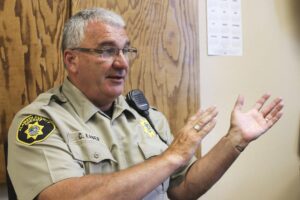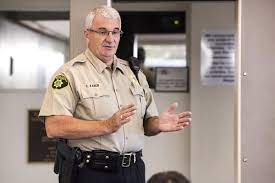The League of Women Voters encourages voter education and participation. One way to learn about offices, candidates, and issues is to speak to candidates before elections (see our past Candidates’ Forum). Another way is to speak to elected officials, either new or returning. In May, 2021 we spoke to Klamath County Sheriff Kaber to learn his views on policing and free speech. The results of our interview are below.

- Sheriff Kaber first listed the various functions of his department, including patrol, jail supervision, civil areas, Klamath Community College, County schools, boating control on waterways, and federally mandated duties.
- He stressed that his first mandate for deputies is a “conservator of peace”, or a “peacekeeper”. He referred to his partnership with KBBH, where mental health professionals ride with patrols at least 24 hours/week, and are able to intervene when needed to help law enforcement when mental health intervention is needed. He also noted that his department helped with the homeless population by using his budget and facilities to provide lunches to the Klamath Falls Gospel Mission on weekends.
- When asked about possible new federal funding for COVID relief for Klamath County, Kaber noted his department costs of $140K to provide COVID-specific services to the jail including sanitizing. He said he would seek reimbursement for these costs if possible.
- Kaber was asked about any department policy regarding the management of “First Amendment assemblies” in the community and he later provided the written document (read it here: https://www.lwvklamath.org/wp-content/uploads/2021/05/KCSO-Policy-466-First-Amendment-Assemblies.pdf). He stated his department in cooperation with KFPD develops “action plans” as a contingency for any such events, while ensuring a peaceful and lawful demonstration. His department works with the city in holding meetings, planning for, and responding to events.
- When asked about his deputies receiving “de-escalation training” (see an example HERE), Kaber said he received none when he began working many years ago. However, these days his deputies receive a lot of de-escalation training. In fact that is a large portion of what they learn when dealing with the public and complaints. This happens both at the academy and with their Training Officers. What they don’t get is a lot of de-escalation training on how to respond to large assemblies (protests). Kaber said that almost every call is daily training on how to lower emotions and solve problems between people.
- Kaber was asked about his department receiving false rumors vs. actual intelligence on relevant activities. He noted that they use the state’s “fusion center”, which surveys social media and other sources of potential information, and tries to squash false rumors when they arise. He gave an example of current “water issues” and an organization called peoplesrights.org which might mobilize 70-80 members to attend a weekly meeting at the “headgates” of the Klamath River. Such action could potentially be viewed as threatening, and his department must determine their response.
- Kaber was asked about any potential federal infrastructure funding, and he discussed a possible community task force to offer input. However, all county funding decisions must ultimately be addressed by the County Commisioners.
We encourage the voting public to learn about the views and actions of all elected officials, to voice their opinions, and to vote at all elections.

I was at Kaber’s presentation and Emily did a terrific job of recording what he said. I learned a lot as a result of this meeting. I hope more people will get involved in LWV Klamath.